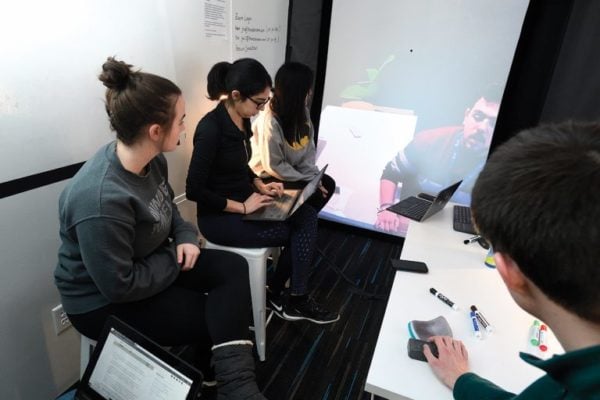A Hackathon with Humanitarian Aims

On a recent day in Clark Hall, undergraduate and graduate students are debating insulation design for shelters to be built halfway around the world. They are participants in the first-ever virtual Humanitarian Design Hackathon at Johns Hopkins, a four-day, high-intensity collaboration with American University in Beirut and Boston University students.
Each of several groups, here in the Department of Biomedical Engineering‘s BME Design Studio, has been tasked with generating a solution to a problem or need faced mainly by Syrian refugees in Lebanon, as reported by AUB students who conducted interviews in a refugee camp.
One team, in BME’s Center for Bioengineering Innovation and Design, is focusing on acute respiratory illnesses, suffered by as many as 19 percent of refugees in the camps, where people burn toxic materials for heat. The students identified increased insulation as one solution: Better-insulated tents would require less fuel to be burned, reducing exposure to emissions. But what design of insulation is best—or even workable—given cost and other constraints?
The group runs some ideas past team members in Beirut. One nifty aspect of the virtual hackathon is the presence of a “portal” at each campus (furnished by Shared Studios), which offer real-time communication with full-size projections of teammates on the other side of the world. When not inside the portal, the group is Skyping by computer and by phone.
Michelle Graham, a PhD candidate studying electrical and computer engineering, holds up her sketch of a wavy form to be filled with some available material—possibly clay? Ideally, the students would like to hit on a design that could be constructed by camp inhabitants, especially the women, who have few activities to do outside of the camp and need the shelter. Involving these women in the fabrication could ease another identified problem: mental distress from boredom and isolation.
But clay won’t work, the AUB students in Beirut say, because the camp has the legal status of “temporary,” and clay might be considered a permanent building material. So the group goes back to brainstorming.
The hackathon is part of a yearlong program funded by a grant from the Aspen Institute’s Stevens Initiative, supported by the U.S. Department of State and the Bezos Family Foundation, among others.
